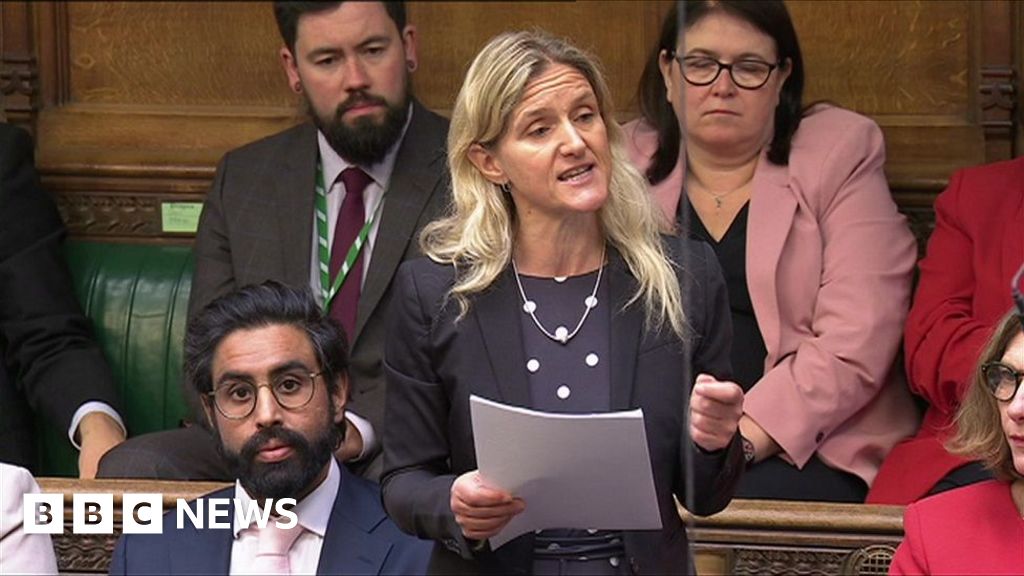One in 10 have no savings and 'buy now, pay later' is surging, financial regulator says

One in 10 have no savings, financial regulator says
Kevin PeacheyCost of living correspondent
 Getty Images
Getty ImagesMillions of people are walking a financial tightrope, with one in 10 UK adults saving no money at all, a major report has concluded.
This leaves many exposed to economic shocks and vulnerable to rising bills, according to the Financial Conduct Authority's (FCA) Financial Lives survey.
Moreover, anxiety and stress levels were relatively high, particularly among those burdened by debt.
But the regulator said the situation had not worsened since the start of the cost of living squeeze and free help was available for those facing trouble.
Snapshot of our money
The FCA's Financial Lives survey is a benchmark for the state of the nation's finances, with nearly 18,000 people questioned about how they deal with money.
The findings suggest that 13 million people - a quarter of the UK adult population - have low financial resilience. That means they have debts that are hard to manage, low savings, and have missed a series of bill payments.
This was unchanged when compared with the previous Financial Lives survey, published in 2022, despite the pressure caused by inflation and rising essential bills on personal finances.
Some 10% of those asked had no cash saved at all. Another 21% had less than £1,000 tucked away.
Other key findings in the wide-ranging report include
- A total of 2.8 million people have persistent credit card debt
- Nearly 12 million people feel overwhelmed or stressed dealing with financial matters, including 40% of adults with credit or loans saying they suffer anxiety and stress
- Some 3.8 million retirees are worried they don't have enough money to last their retirement
- Difficulties getting to a bank branch face nearly 10 million people
"Our data shows that finances are stretched for many - with some unable to save for a rainy day," said Sarah Pritchard, from the FCA.
Buy now, pay later surges
The report also suggests that the use of buy now, pay later has risen significantly in recent years.
Some 40% of lone parents and 35% of women aged between 25 and 34 use these deferred credit products, which remain unregulated.
Overall, nearly half of adults have outstanding unsecured debt, where the money borrowed is not backed up by assets.
The FCA said the median average amount of debt outstanding among those with debt was £6,300.
Among 18 to 34-year-olds with debt, the median average amount of debt outstanding was £12,500. But, after excluding student loans, that dropped to £1,300.


Debt advisers say they routinely speak to people with mental health issues, which either result in financial difficulties or are caused by money worries.
They say it takes courage to pick up the phone to ask for help, but free debt advice is available and has no impact on someone's credit score.
How to deal with money worries
Matt Dronfield, managing director of Debt Free Advice - a coalition of charities which can negotiate with creditors on behalf of borrowers - said rent or mortgage arrears, council tax and falling behind on utility bills were the three most common forms of debt.
He said many callers were juggling multiple jobs, but unable to cover their essential expenses.
"It is so common. If you're not worried, then a friend or family member is definitely going to be," he said.
"We know you are more likely to tell your pet than your partner or loved one about your financial situation. So, speak to an expert debt adviser about the situation that you are in.
"If you were worried about your health, you'd see a doctor. If you're car wasn't working, you'd go to a mechanic. So, if you are worried about your finances, speak to an independent debt adviser, for free."
He also said that people with no savings should consider "paying yourself first", by putting a few pounds into a savings account when their receive their income.
This could help get them into a savings habit, while still being able to cover the priority bills.
The average amount people have saved is £5,000 to £6,000, the FCA's report suggests.


Get our flagship newsletter with all the headlines you need to start the day. Sign up here.
What's Your Reaction?
 Like
0
Like
0
 Dislike
0
Dislike
0
 Love
0
Love
0
 Funny
0
Funny
0
 Angry
0
Angry
0
 Sad
0
Sad
0
 Wow
0
Wow
0






































